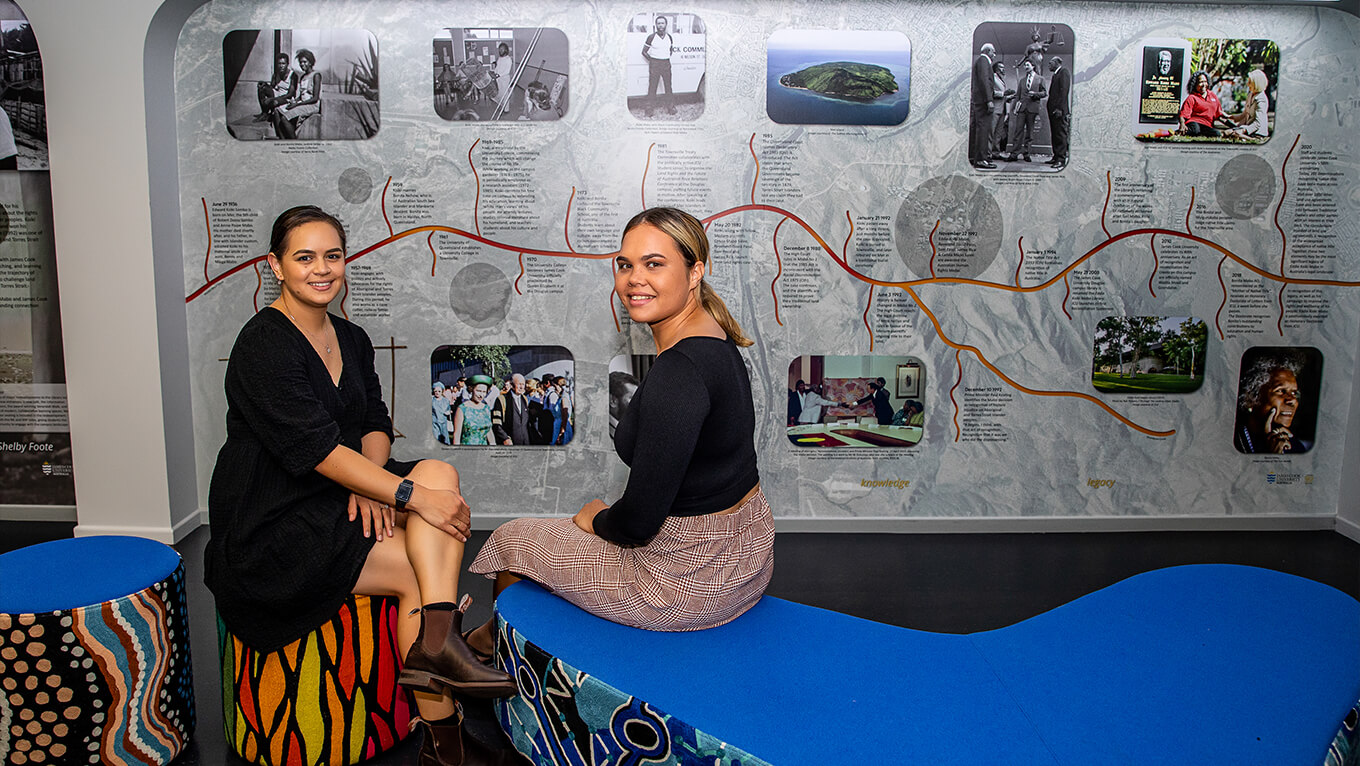The purpose of the IERC
We are a leader in providing Indigenous education, research and engagement. Our sustainable programs and services are designed to foster our students to be independent, critical and analytical thinkers thriving in both academic and real world contexts. Built on the foundation of self-determination, our students develop the confidence and necessary skillsets to plan and achieve goals for themselves and their broader communities.
We have a wealth of professional development opportunities, mentor and peer-support programs, and learning support, as well as free learning, reading, writing and maths study sessions. Check out our centers at the Bebegu Yumba (Townsville) and Nguma-bada (Cairns) campuses to take advantage of our dedicated meeting spaces and computer labs for ongoing peer support.
You can also view our news and events page to keep up to date with what we're up to no matter where you are!

The Indigenous Education and Strategy Division
In their capacity as a key figure within the university's executive team, the Deputy Vice Chancellor for Indigenous Education and Strategy (DVC(IES)) assumes a position of senior leadership. The DVC(IES) is tasked with engaging across all facets of university planning, playing a pivotal role in championing and advancing the institution's objectives and core values. Through active participation, the DVC(IES) significantly influences the university's overarching decision-making processes, vision development, policy formulation, and overall growth trajectory.
The DVC(IES) is responsible for cultivating and nurturing meaningful relationships, strategic alliances, and partnerships that contribute to the elevation and advancement of the university's profile as a distinguished institution. This involves proactive engagement in initiatives aimed at enhancing the university's standing within the broader community. Additionally, the DVC(IES) collaborates with and provides regular reports to the University Council on the progress and performance of the institution's Indigenous priorities and targets, ensuring transparency and accountability in achieving these objectives.
Our History
For almost 50 years the IERC has been the anchorage for our First Nations people in the higher education sector at JCU. Transformed from the Aboriginal and Islander Teacher Educational Program (AITEP) in 1977 to being formally established in 2015, the IERC represented a 50% increase in JCU's investment in Indigenous student support, learning and teaching, and research and community development.
In 2017 a building on the JCU's Nguma-bada - meaning "Belonging to Tomorrow" - Cairns campus was allocated to the IERC staff who were originally located around the university. In 2018 the Bebegu Yumba - meaning “Place of Learning” - Townsville campus had a new building constructed for the IERC. Both campus' centers were designed to promote collaboration between students and staff, bringing together research, teaching and support facilities and supported more than 500 Australian Aboriginal and Torres Strait Islander students. This number has since increased to almost 800 students who have 24/7 secure access to study nooks, private tutorial rooms, group work resources and kitchen facilities.
Today, the IERC continues to thrive, celebrating a graduation rate of 120 Indigenous students annually, making it the fourth highest in the country. Staffed by dedicated Indigenous personnel, the IERC offers invaluable guidance on enrolment procedures, pathway programs, and scholarship options, ensuring that every student receives the support they need to thrive.
Witnessing a growing number of Indigenous graduates returning to their communities armed with newfound knowledge and skills is a source of immense pride for JCU. These individuals, having benefited from the university’s empowering environment, are now better equipped to drive self-determination plans and seize control of their own futures.
Related information
Our governance
Find out about JCU’s Governance through reconciliation, IERC’s operational plan, Indigenous workforce strategy and ISSP reports. The links give you access to further information on JCU and the IERC’s commitment to implementation and action.
What is Reconciliation?
Reconciliation is an honest and critical understanding of Australia's shared history, and how it has informed the lives of Australian Aboriginal and Torres Strait Islander peoples and other Australians today.
Reconciliation involves other Australians and Aboriginal and Torres Strait Islander peoples building and preserving mutual, positive, and respectful relationships. It involves optimising these relationships and working together on closing the gap; achieving a shared sense of fairness and justice as a foundation for success; and enhancing our national well being.
Reconciliation Action Plan
The original Reconciliation Action Plan (RAP) was developed following a May 2013 commitment by the JCU Vice Chancellor to develop our first action plan. This plan was based on JCU’s desire to strengthen our commitment to enhance the lives of Australian Aboriginal and Torres Strait Islander peoples through education and research.
The Indigenous Centre has a University-wide remit to deliver key elements of the University’s strategic objectives to embrace diversity and bring about enduring benefits for Aboriginal and Torres Strait Islander peoples.
Find out more about Our Mission, Our Goal, Our Enabling Framework, and Our Plan in the Indigenous Education and Research Centre's Operational Plan 2020-2022.
The Australian Aboriginal and Torres Strait Islander Workforce Strategy 2021-2025 has been developed in the context of James Cook University continually seeking to enhance its relationship with the Australian Aboriginal and Torres Strait Islander community.
- Indigenous Student Success Program (ISSP) 2020 Performance Report
- Indigenous Student Success Program (ISSP) 2020 Financial Acquittal
- Indigenous Student Success Program (ISSP) 2019 Performance Report
- Indigenous Student Success Program (ISSP) 2019 Financial Acquittal
- Indigenous Student Success Program (ISSP) 2018 Performance Report
- Indigenous Student Success Program (ISSP) 2018 Financial Acquittal
Cultural protocols
The below information invites you to gain a better understanding of what ‘Acknowledgement to Country’ is and why it’s important. It also goes through when and how to respectfully demonstrate this. You can also view traditional owner group names for your local area and appropriate wording for you to consider for speaking, writing and publishing Acknowledge to Country.
An ‘Acknowledgement of Country’ is a way of showing awareness of and respect for the Traditional Owners of the land on which a meeting or event is taking place.
At the event, the speaker giving the Acknowledgement of Country may be an Australian Aboriginal and/or Torres Strait Islander from another community, or not identify with either of these cultures. The speaker should begin their proceedings by offering an Acknowledgement of Country. The Chair or Master of Ceremonies (MC) of the event is usually the appropriate person to acknowledge the Traditional Owners.
An Acknowledgement of Country, sometimes called an Acknowledgement of Traditional Owners, allows people who are not Traditional Owners to pay respect to the fact that they are on Aboriginal or Torres Strait Islander land, and recognise the continuing connection of Australian Aboriginal and Torres Strait Islander peoples to their Country. This Acknowledgement can occur with or without a Welcome to Country and/or when a smaller or less formal gathering is taking place.
If a Traditional Owner happens to be present, that person is invited to give a Welcome to Country by the Chair or MC. If a Traditional Owner is not present, then the first speaker, usually the MC, must acknowledge the Traditional Owners of the land where the event is taking place.
If you have organised a Welcome to Country, then once the Welcome to Country is complete, the MC will thank the Elder for welcoming them to Country and then give an Acknowledgement of Country. Subsequent speakers may also choose to give an Acknowledgement of Country.
When to include an Acknowledgement of Country
Examples of when you would give an Acknowledgement of Country at JCU as a mark of respect for the owners of the land on which the event is taken place include:
- At the beginning of every semester for each new subject
- Chair of Committees at the first meeting of the year
- Significant meetings, conferences and forums with a range of internal and external stakeholders present
- All the events listed where a Welcome to Country is given.
You are encouraged to create your own words that reflect how you feel about being on the land of Australia’s Aboriginal or Torres Strait Islander peoples, or you can also use the below examples which have been approved by a JCU Australian Aboriginal and Torres Strait Islander Reference Group. You will also find many other examples throughout the internet.
Make every attempt to determine the name of the Traditional Owners in preparation for an event, but if you are uncertain a general acknowledgement is acceptable.
CAIRNS
Djabugay (pronounced Jap-ur-kai)
and
Yirrganydji (pronounced Irri-kan-dji)
and
Gimuy Yidinji (pronounced Goom-eye Yidinji)
TOWNSVILLE
Bindal (pronounced Bin-dul)
and
Wulgurukaba (pronounced Wulga-rooka-ba)
MACKAY
Yuibera (pronounced You-berra)
MOUNT ISA
Kalkadoon (pronounced Kalka-doon)
THURSDAY ISLAND
Kaurareg (pronounced Car-ra-reg)
SPOKEN ACKNOWLEDGEMENT
"I acknowledge the Australian Aboriginal and Torres Strait Islander peoples as the first inhabitants of this country and pay my respects to the Traditional Owners and Elders, past and present, of the land on which we stand today, the [INSERT NAME(S) OF TRADITIONAL OWNER GROUPS] people.
In the spirit of reconciliation, I also acknowledge the valuable contribution that Australian Aboriginal and Torres Strait Islander peoples continue to make to James Cook University and the broader community."
PRINTED OR ONLINE ACKNOWLEDGEMENT
To include Acknowledgement on a printed document, ideally it should be placed on the inside front cover, standing alone, in a place of significance.
"At James Cook University, we acknowledge the Australian Aboriginal and Torres Strait Islander peoples of this nation. We acknowledge the Traditional Owners of the lands on which our campuses and study centres are located and where we conduct our business. We pay our respects to ancestors and Elders, past, present and future. JCU is committed to honouring Australian Aboriginal and Torres Strait Islander peoples’ unique cultural and spiritual relationships to the land, waters and seas and their rich contribution to JCU and society."
WEBSITE ACKNOWLEDGEMENT
"We acknowledge the Australian Aboriginal and Torres Strait Islander peoples as the first inhabitants of the nation and acknowledge Traditional Owners of the lands where our staff and students, live, learn and work."
